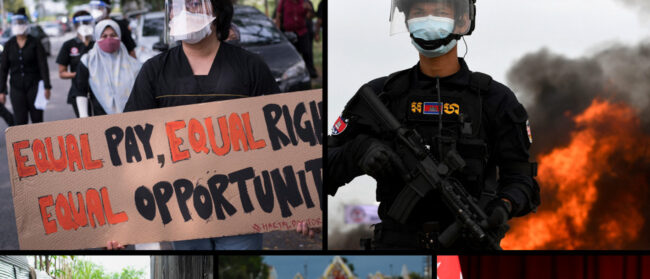This week I start with a personal announcement. After a few years of solidly working, holidays few and far between, I’ll be heading back to my native London for an extended break. It’s been 18 months since I was last home, or even left Cambodia – the pandemic keeping me firmly rooted within the Kingdom’s borders since March 2020.
From there, I’ll be assuming an editor at large role with the Globe, editing articles and writing the occasional feature. That, of course, leaves a vacancy at the helm of this great publication, one that will be filled by not one, but two new arrivals.
On Wednesday, we had two new faces join the Globe in what is an exciting shake-up of our editorial team. First up, let me introduce Amanda Oon. A fellow Londoner (and SOASian), Amanda has familial ties to the city-state, where she’ll be serving as our new Singapore-based editor.
Amanda and I have been in contact since April last year when she first wrote this piece for us on women in Singapore’s fintech scene. Along with her writing talents, with a more business-focused background, Amanda can bring some of the organisational spirit we probably lack in the laissez faire, slow-paced world of feature journalism.
Next up, we have Brian Hannon. A seasoned journalist with two and a half decades of newsroom experience, working for the likes of AP, Brian has just made the short hop from Rhode Island to Phnom Penh. As of this morning he has been liberated from his two-week quarantine and will be joining us in the office shortly, serving as a steady editorial hand to guide our revamped ship.
They’ll begin running the show as of next week as we continue along this journey of growth and evolution as a publication. In the meantime, thank you for your support over the past two years, and as always, we hope to have an open door policy, so don’t hesitate to reach out and connect.
Thanks, take care, and without further ado on to this week’s features!
You’ve likely not heard of it, but this US-funded fact checking website aiming to fight misinformation in Cambodia was shut down last month after three weeks in operation. CambodiaCheck crumbled under the weight of criticism, as a questionable string of analyses began with a controversial attempt to debunk Human Rights Watch. At risk of blindly upholding the truth as Cambodia’s ruling party would have it, the CambodiaCheck debacle highlights the difficulties and dangers of foreign-funded fact-checking in a country wielding “fake news” as a political weapon, I wrote in a piece published today.
An upcoming UN General Assembly will decide Myanmar’s legitimate UN representative, providing an opportunity to legitimise the civilian National Unity Government (NUG) at the expense of the military junta which overthrew it, the NUG’s charismatic public face Dr Sasa told Jessica Mudditt this week. She spoke with him about the resistance movement’s struggle to gain the support of the international community, both in restoring democracy and combating the growth of Covid-19.
In Khmer-dominant Cambodia, indigenous youth in the country’s northeast are learning to make films in their own languages and communities through the Bophana Centre’s “Amplifying Voices” programme. In his first piece for us, new Globe report/editor Jack Brook recounted the story of one filmmaker attempting to document and preserve his Kreung culture’s intangible heritage, his films serving as both an archive and a form of knowledge-sharing.
With Covid intensifying in Vietnam and ride-hailing apps such as Grab suspended, Ho Chi Minh City’s taxi drivers have had an unlikely resurgence, reports Madeleine List. Yet the relative economic boon for taxis on the frontlines comes with a high risk to health and happiness.
As Malaysia turned 58 this week, Dr. James Chin wrote that the state needs to have a national conversation about its identity issues. Through concerted efforts by politicians, attempts are being made to conflate being Malaysian with being Muslim, coming at expense of the federation’s rich tapestry of religions, identities and cultures.


